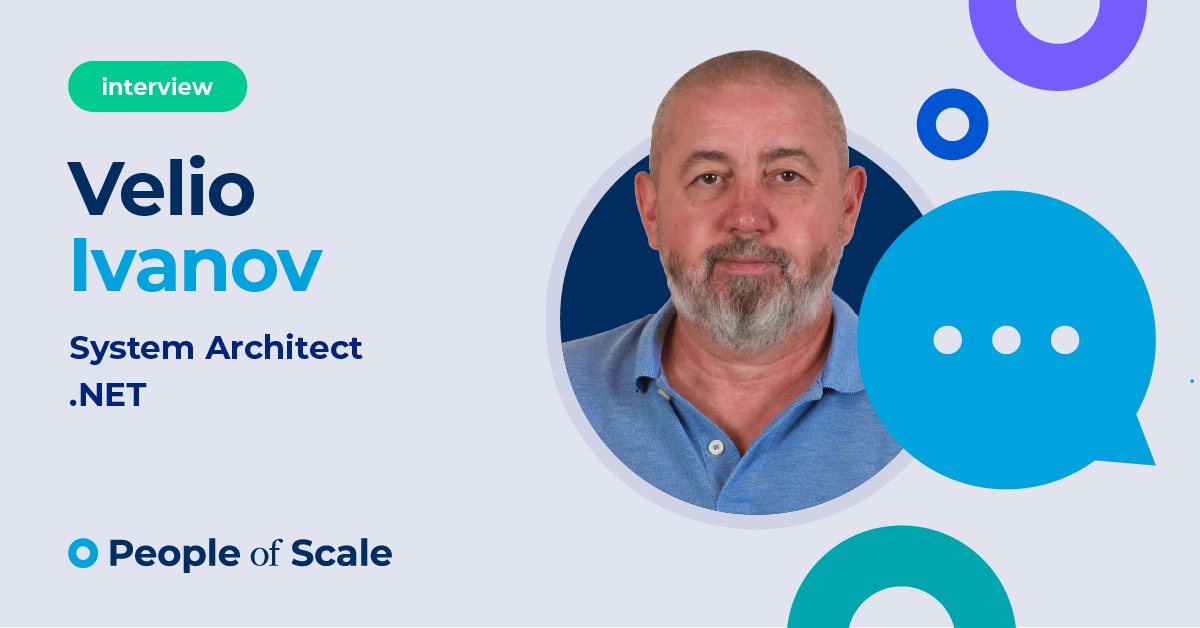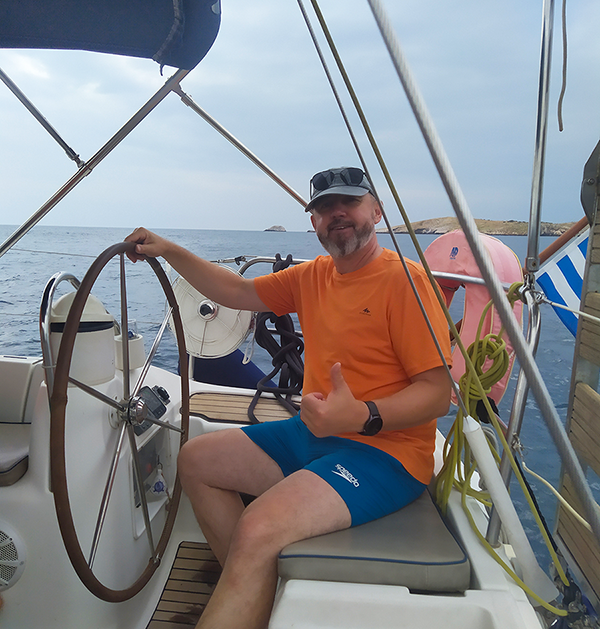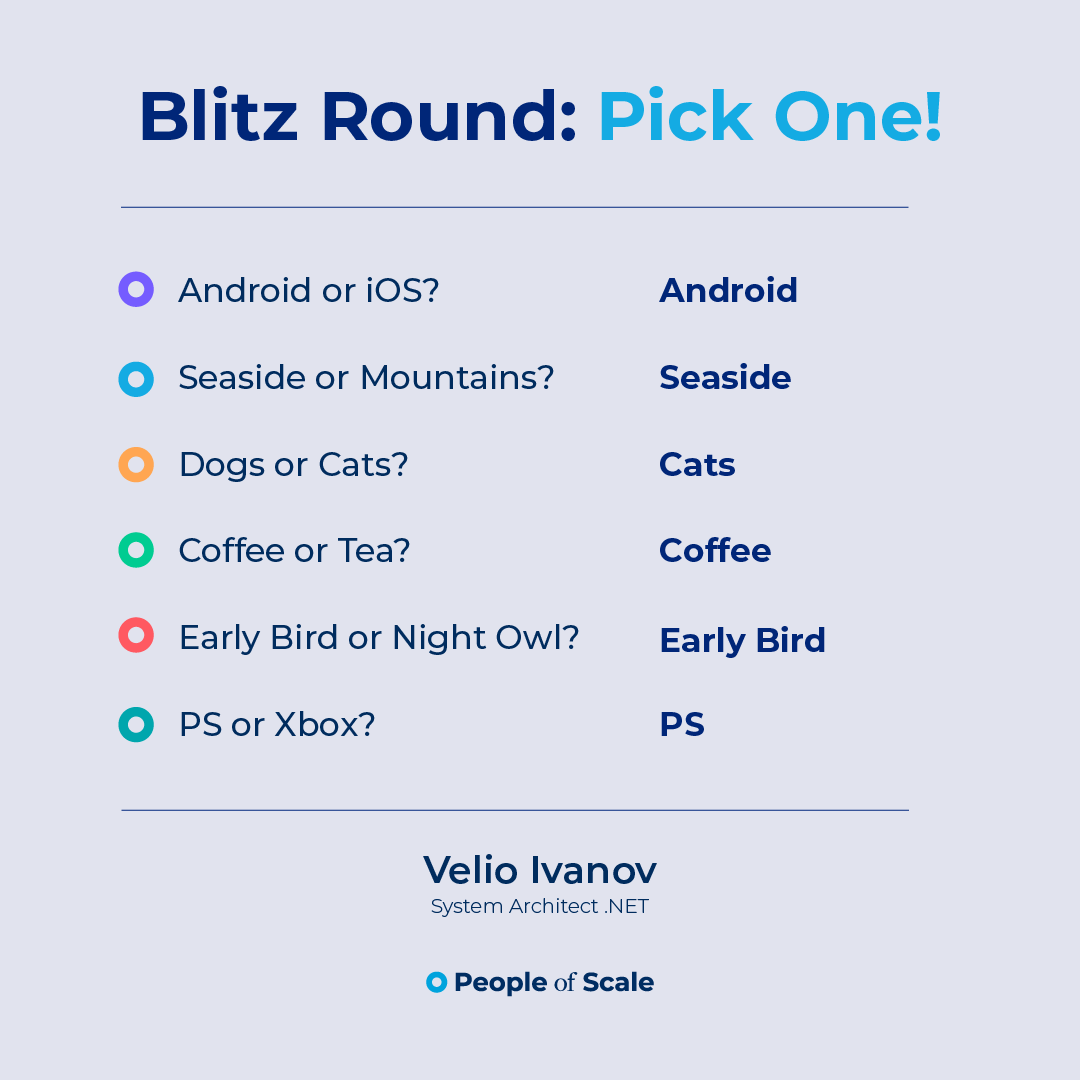Velio Ivanov, System Architect at Scalefocus, thrives at the intersection of technology and leadership. With a career spanning backend architecture, cloud systems, and guiding teams, he’s driven by adaptability, collaboration, and problem-solving. Outside of code, you’ll find him brewing craft beer, fishing by the seaside, or enjoying soccer – hobbies that fuel his patience, creativity, and teamwork.

Tech & Career
You’ve worked on a wide range of projects at Scalefocus.
How do you adapt your architecture to different tech stacks and requirements?
I believe adaptability and understanding the core business needs are key. I start by thoroughly analyzing the requirements, infrastructure, and user base. With experience across diverse technologies, I can choose the most suitable architecture for each case.
Working with .NET Core, ASP.NET MVC, microservices, and cloud – what’s a challenge you enjoy solving again and again?
I enjoy tackling complex integration and scalability issues. These challenges push my problem-solving skills and deepen my understanding of distributed systems, which aligns with my passion for evolving industry standards.
Which type of work has pushed your skills the most, and what did you learn from it?
Large-scale enterprise platforms challenged me to think deeply about performance, security, and scalability. They taught me the importance of meticulous planning, robust testing, and clear communication within cross-functional teams.
How do you balance technical excellence with fast-paced delivery in complex systems?
I emphasize strong coding standards, thorough code reviews, and automated testing. My experience helps me identify the minimal viable architecture that delivers value quickly without sacrificing quality. Team collaboration and transparent communication are also essential.
You’ve contributed to both backend architecture and leadership. How do these roles complement each other?
Working on backend architecture gives me hands-on insight into technical challenges, which informs my leadership. In turn, leadership allows me to foster collaboration, set clear direction, and ensure best practices are followed. Together, they create synergy that benefits both project outcomes and team growth.

Culture & Growth
What has leading development teams taught you about leadership?
It has taught me the importance of active listening, empowering team members, and fostering a culture of continuous learning. Good leadership is about guiding, motivating, and enabling others to excel, while staying flexible and adaptable.
How do you encourage collaboration between teams working on different technologies?
I promote open communication, shared goals, and regular knowledge-sharing sessions. I also encourage cross-team code reviews and collaborative problem-solving, which help break down silos and build a unified approach.
What advice would you give developers aiming to move from coding to system architecture?
Focus on the big picture – study design patterns, scalability, and business impact. Take ownership of modules, seek mentorship, and gain hands-on experience designing solutions. This will help you see beyond code and think architecturally.
When a project hits a technical roadblock, how do you guide your team to a solution?
I facilitate open discussions, encouraging team members to share their perspectives. We analyze the problem, consider alternatives, and weigh trade-offs. My goal is to create an environment where the best solution emerges collectively.
How do you measure success – for both projects and your team?
Success is measured by the quality of deliverables, team growth, and meeting or exceeding client expectations. A thriving team collaborates well, learns continuously, and takes pride in its work.

Beyond the Code
Outside of work, you enjoy brewing beer, fishing, and soccer. How do these hobbies influence your problem-solving?
They teach patience, strategy, and teamwork. Brewing requires attention to detail; fishing develops patience and persistence; soccer emphasizes agility and collaboration – all qualities I apply when tackling technical challenges.
If you could design any software tool with no limits, what would it be?
I’d create an intelligent, adaptive development environment that suggests architecture improvements, optimizes code, and predicts potential issues – making software development faster, smarter, and more reliable.
As a Game of Thrones and Star Wars fan, which character do you relate to most, and why?
I relate to Tyrion Lannister for his wit, strategic thinking, and ability to adapt. Like him, I believe in intellect and diplomacy to overcome challenges. From Star Wars, I resonate with Obi-Wan Kenobi’s patience and wisdom, and his belief that sometimes the best solutions come from calm, measured approaches.
What’s a fun fact your colleagues might not know?
Long ago, I mentored some colleagues who are now in senior management. I’m proud to see how far they’ve come.
If you weren’t in tech, what would your dream career be?
I’d love to be a professional brewer or a chef. Both require creativity and attention to detail – much like software development.

Blitz Questions (the long version)
Android or iOS?
I don’t have a strong preference, but I appreciate Android’s openness and flexibility.
Seaside or Mountains?
Seaside. I love fishing and find the beach both relaxing and inspiring.
Dogs or Cats?
Cats. I enjoy their independence, calm nature, and the way they show affection.
Coffee or Tea?
Coffee, especially in the mornings to kick-start my day.
Early Bird or Night Owl?
Early Bird. I’m most focused and productive in the mornings.
PS or Xbox?
PlayStation. Even though I don’t play often, I enjoy its game lineup and overall experience.



